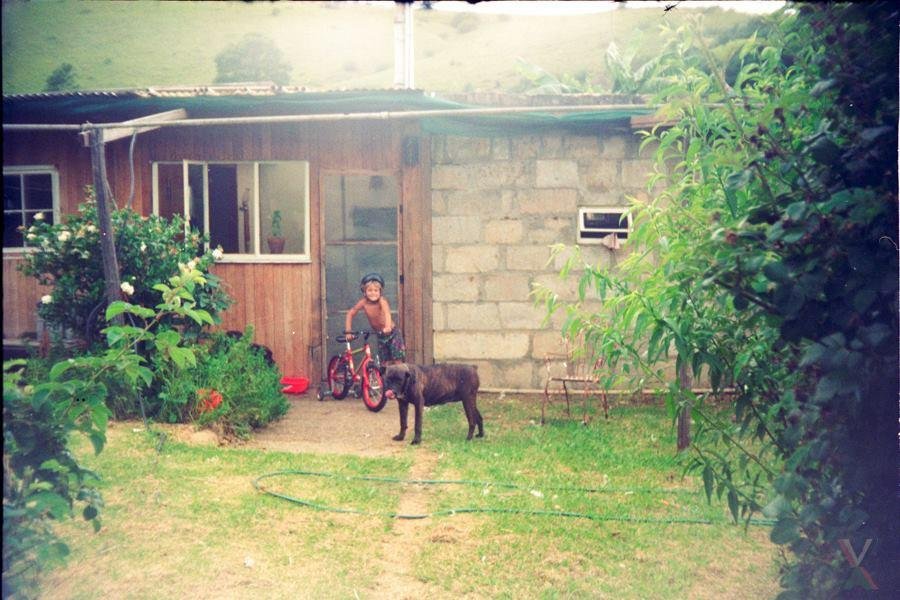1995 Childhood home, Riversdale, SA
2024 Nirox Foundation, SA
Abdus Salaam, born 1989 in Cape Town, South Africa is a cultural fusion of Western, Eastern and African sensibilities. He spent his formative years on a remote South African farm without electricity, where he painted and sculpted with earth, stone, and clay at the waterhole. At age nine he met Ma Rukea, a matriarch of the Cape Muslim community and embraced Islam of his own accord. At ten, his path turned unexpectedly toward Los Angeles, where the pulse of a new world deepened his awareness of art and the fragile harmony between nature, spirituality and modernity.
A self-taught multidisciplinary artist based in Cape Town, Salaam channels the metaphysical language of nature, translating its silences into form and colour. His works meditate on time — the breath between the cosmic and the intimate — and on the ethereal relationship between matter and meaning. Rooted in his poetry and his spiritual practice, his art is both prayer and exploration, seeking unity, surrender, joy and transcendence. Working in solitude, he weaves intention into every fibre of his artworks, allowing sculpture, painting, film, and sound to become vessels of spiritual resonance — portals into contemplative worlds of remembrance, oneness, and awakening, where art becomes both offering and reflection of the divine nature of all things.
Beauty is the purest protest
Beauty is the purest pain
For the purest beauty is love
Wherein I am most vulnerable
And human, again.
-Abdus Salaam
An excerpt from writings by art critic and author Ashraf Jamal.
What remains when sight departs and is no longer the crux of perception? When touch is no longer the source of meaning? When, unchained to the senses, life’s truth is profoundly altered? Is one still human? And is this attachment to our baser instincts – our mortality – the entire reason for being? These questions are at the root of the art of Abdus Salaam. A poet, sculptor, musician and painter, Salaam’s art is a pilgrimage and a quest. Its purpose is not to gratify the known world, to signal, through art, the condition of the present moment, or the era or age that he inhabits. Unmoved by precedent, at odds with contemporaneity, sceptical of any programmatic projection of a future, Salaam chooses, instead, to embrace a transcendental immanence. His art, no matter its physicality, is attuned to the suprasensible. As such, it is mediumistic – a portal between worlds.
One cannot understate the comparative rarity of Salaam’s vision. His is an art palpably significant precisely because of its impalpability – given that its desire and affect thrive beyond its visceral embodiment. We behold a thing – some thing – made of stone or paint, sound or words, that appears under the sign we call ‘Art.’ Its economy of exchange is, thereby, accounted for. And yet, it has become increasingly evident that that transaction is limited and limiting, for what Salaam searches for, above all else, is transcendence through art. Is he a dervish, a mystic, a romantic for our beleaguered age? If so, can these categories remain unconfined and open when addressing Salaam’s art, given that categories, as a rule, tend to be prohibitive?
If openness is vital, it is because Salaam’s art will not be tamed by reason or belief, it cannot be explained away. While it is certainly devotional – Salaam adheres to an Islamic faith, his art moved by scripture, it nevertheless surpasses the theological framework ascribed to it. This is because Salaam’s art can reach all faiths, all truths, that are supple enough to transcend orthodoxy. For what the artist reveres above all else is the divine – a divinity that surpasses any inherited culture or system – a belief that faith, when experienced profoundly, is irreducible to time.
ASHRAF JAMAL is a Senior Research Associate in the Visual Identities in Art and Design Centre, University of Johannesburg. He is the co-author of Art in South Africa: The Future Present and the co-editor of Indian Ocean Studies: Social, Cultural, and Political Perspectives. Jamal is also the author of numerous artists’ monographs and books, including In the World, Strange Cargo, looking into the mad eye of history without blinking, and African Art: The ARAK Collection.

